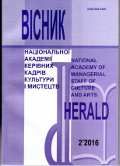TRANSFORMATION OF THE MEMORIAL SPACE AND MEMORIAL PRACTICES IN UKRAINE IN THE PERIOD OF INDEPENDENCE
DOI:
https://doi.org/10.32461/2226-3209.2.2016.138498Keywords:
culture, cultural memory, places of memory, memory, Ukrainian cultureAbstract
The purpose of the study is to conceptualize a new vision of cultural memory of Ukraine. The following special scientific research methods are applied: memorial cartography, which enables to create a kind of map of «places of memory» for a particular culture (in our case – museums); memorial political analysis helps to study the full range of official and non-official, national and regional policies of memory. Scientific novelty lies in the further development of the author’s structural and functional model of the memorial landscape of Ukrainian culture as a complex, multi-layered and diverse formation and commemorative practices of its functioning on the basis of large transformations in 2013–2016. Conclusions. The study shows that the transition from mechanical combination of different chronological layers of memory to in a certain way structured system is completed. A complex of places of memory, including memorials to social and political and cultural figures and numerous monuments dedicated to Cossacks is becoming a basis of the cultural memory of Ukraine. This process may be accelerated by the well-directed state memorial practicies, the quantity, regularity and scale of which is constantly growing starting from the 2000th.
Downloads
Published
Issue
Section
License
Authors who publish with this journal agree to the following terms:
1. Authors retain copyright and grant the journal right of first publication with the work simultaneously licensed under a Creative Commons Attribution License that allows others to share the work with an acknowledgement of the work's authorship and initial publication in this journal.
2. Authors are able to enter into separate, additional contractual arrangements for the non-exclusive distribution of the journal's published version of the work (e.g., post it to an institutional repository or publish it in a book), with an acknowledgement of its initial publication in this journal.
3. Authors are permitted and encouraged to post their work online (e.g., in institutional repositories or on their website) prior to and during the submission process, as it can lead to productive exchanges, as well as earlier and greater citation of published work (See The Effect of Open Access).


